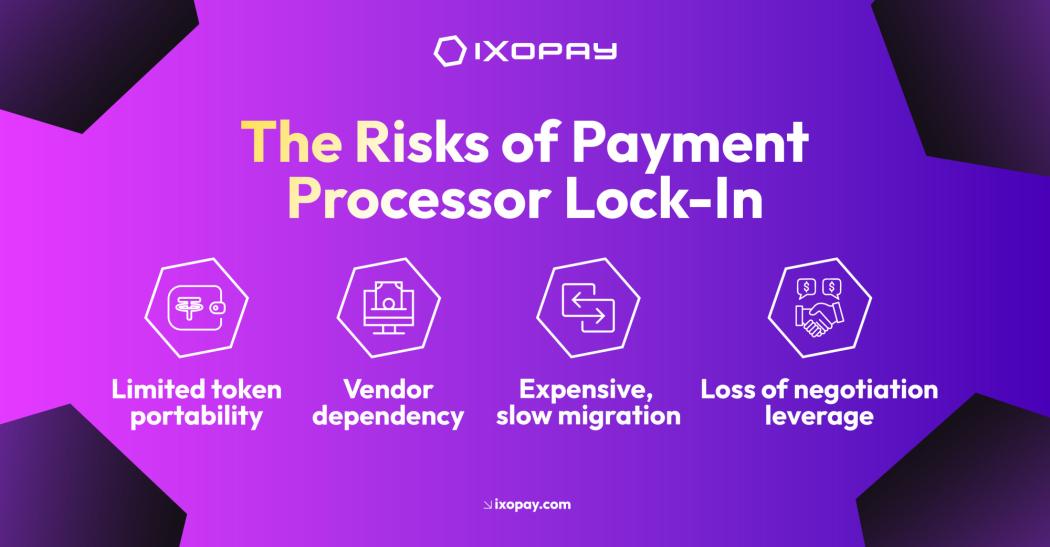You’ve Outgrown a Single-Processor Solution
As the world of global commerce expands, so do customer expectations. This means that relying on a single processor is no longer scalable—yet many merchants remain trapped without realizing it.
Processor lock-in happens when a merchant’s payment operations (and critically, their stored card data) are tied to a single PSP or acquiring bank. In this post, we’ll explore how lock-in limits flexibility, cost-efficiency, and growth—and what merchants can do to regain control.
What Is Processor Lock-In—and Why It Happens
Storing card data in a payment processor’s proprietary vault may seem convenient at first, but it creates long-term dependency, making migration difficult and expensive. Being locked in means being boxed in. And this rigidity can quickly become a bottleneck.
Some of the pitfalls associated with processor lock-in are:
Limited token portability: Due to the unique token formats of each provider, tokens often can’t be transferred from one processor to another.
Using a PSP vault for recurring billing: You can’t easily switch providers without disrupting subscriptions. Migrating to a new system typically requires re-onboarding customers—a friction-heavy process that can lead to churn.
Other risks include:
Vendor dependency: Your payment infrastructure is controlled by a single provider, leaving little room for competitive alternatives.
Expensive, slow migration: You are limited by your provider’s features and roadmap, so accessing something like a new digital wallet could take a long, indeterminate amount of time.
Loss of negotiation leverage: In addition to losing your power to push for better rates or terms, you have limited ability to expand globally. Large PSPs offer regional coverage, but it is difficult, if not impossible, for them to offer global support.
Bottom line? If your sole provider experiences an outage, raises fees, or alters their terms, your business bears the consequences.
Why Owning Your Stored Card Data Is Strategic
This is where token vault independence—aka, a neutral vault that allows portability and control across different systems—comes in. By maintaining ownership of your stored card data (and assuming partnership with the right tokenization provider), you gain the freedom to route transactions dynamically, optimizing for costs and global reach.
Benefits of owning your tokenized data include:
Easier migration between PSPs
Better fallback and retry logic
Higher negotiating power
Resilience in the face of outages or performance dips
Don’t forget: When it comes to recurring payments and subscriptions, customers expect continuity, and lock-in can disrupt it. Take control of your data and save your business from churn.
We Live in a Multiprocessor World
According to the Merchant Risk Council, the average merchant uses four processors and three different acquiring banks. Why? Different processors excel in various regions (e.g., Brazil’s PIX, SEPA in Europe). For those looking to improve authorization rates through intelligent routing and mitigate performance issues, the question isn’t if they should diversify—it’s how.
The Benefits of Multiprocessor Strategy
The benefits of a multiprocessor strategy are vast. Merchants can expect to see improvements in these key areas:
Flexibility: You can add or remove processors as business needs change.
Performance: With the right payment orchestration strategy, optimized routing can increase success rates.
Localization: Bolster support for region-specific payment methods.
Cost control: Choose processors based on transaction fees, FX, or local compliance.
Redundancy: Reduce single points of failure.
How to Break Free from Processor Lock-In
Payments should be a growth lever, not a constraint. To escape processor lock-in and reclaim your data, start with these first five steps:
Step 1: Use a payment orchestration platform that supports token vaulting and multi-processor connectivity (aka, a provider-agnostic platform).
Step 2: Ensure your tokens are portable and vault-independent.
Step 3: Design your stack to support smart routing, fallback logic, and modular scaling.
Step 4: Negotiate contracts with flexibility and data portability in mind.
Step 5: Align your payments team around ownership of data, not reliance on vendors.
How IXOPAY Helps
IXOPAY offers enterprise-grade payment orchestration and tokenization solutions ready to scale with you. Some of our key benefits include:
Independent PCI-compliant token vault
Easy migration from PSP vaults to merchant-owned tokenization
Processor-agnostic architecture that supports 200+ PSP integrations and 300+ payment method integrations
Control over your data and flexibility to adapt globally
Conclusion: Growth Requires Freedom
Relying on one or two processors may have worked in the past, but for scaling merchants, flexibility is now non-negotiable. Owning your token data, leveraging multiple processors, and using payment orchestration are the keys to unlocking global growth, cost efficiency, and customer satisfaction.
Break free from lock-in and start building a future-ready payment strategy.
Talk to an expert or download our payment orchestration guide today.
